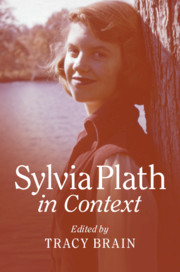Book contents
- Sylvia Plath in Context
- Sylvia Plath in Context
- Copyright page
- Contents
- Notes on Contributors
- Acknowledgements
- Chronology
- Abbreviations and Textual Note
- Key Archives
- Introduction
- Part I Literary Contexts
- Part II Literary Technique and Influence
- Part III Cultural Contexts
- Part IV Sexual and Gender Contexts
- Part V Political and Religious Contexts
- Chapter 19 The Bell Jar, the Rosenbergs and the Problem of the Enemy Within
- Chapter 20 Religious Contexts for Plath’s Work
- Chapter 21 Plath and Nature
- Chapter 22 Plath and War
- Part VI Biographical Contexts
- Part VII Plath and Place
- Part VIII The Creative Afterlife
- Bibliography
- Index
Chapter 21 - Plath and Nature
from Part V - Political and Religious Contexts
Published online by Cambridge University Press: 03 August 2019
- Sylvia Plath in Context
- Sylvia Plath in Context
- Copyright page
- Contents
- Notes on Contributors
- Acknowledgements
- Chronology
- Abbreviations and Textual Note
- Key Archives
- Introduction
- Part I Literary Contexts
- Part II Literary Technique and Influence
- Part III Cultural Contexts
- Part IV Sexual and Gender Contexts
- Part V Political and Religious Contexts
- Chapter 19 The Bell Jar, the Rosenbergs and the Problem of the Enemy Within
- Chapter 20 Religious Contexts for Plath’s Work
- Chapter 21 Plath and Nature
- Chapter 22 Plath and War
- Part VI Biographical Contexts
- Part VII Plath and Place
- Part VIII The Creative Afterlife
- Bibliography
- Index
Summary
Richard Kerridge describes the literary, cultural and scientific context of Plath’s interest in wild animals, landscape, climate and pollution. The letters and journals show that this interest was intense, but also that it was not scientific or systematic, even in a rudimentary way. Plath’s strategy was to preserve the dramatic immediacy of unexpected encounters with wildlife, rather than frame those encounters with scientific information. Nevertheless, an emergent ecological consciousness and environmental concern are evident in her writing. Kerridge provides the historical and scientific background for this concern, by outlining the major conceptual shifts that were taking place in ecological science, the recent history of wild nature in literature, and some of the changing popular attitudes in Britain and the USA.
Keywords
Information
- Type
- Chapter
- Information
- Sylvia Plath in Context , pp. 221 - 232Publisher: Cambridge University PressPrint publication year: 2019
